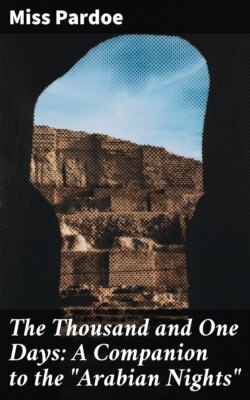Читать книгу The Thousand and One Days: A Companion to the "Arabian Nights" - Miss Pardoe - Страница 3
На сайте Литреса книга снята с продажи.
INTRODUCTION.
ОглавлениеTable of Contents
The Compiler of the graceful little volume which I have the pleasure of introducing to the public, has conferred an undeniable benefit upon the youth of England by presenting to them a collection of Oriental Tales, which, rich in the elements of interest and entertainment, are nevertheless entirely free from the licentiousness which renders so many of the fictions of the East, beautiful and brilliant as they are, most objectionable for young and ardent minds. There is indeed no lack of the wonderful in the pages before us, any more than in the Arabian and Persian Tales already so well known: but it will be seen that the supernatural agency in the narratives is used as a means to work out totally different results. There is, in truth, scarcely one of these Tales which does not inculcate a valuable moral lesson; as may be seen by reference to "The Powder of Longevity," "The Old Camel," and "The Story of the Dervise Abounadar" among several, others.
The present collection of Eastern Stories has been principally derived from the works of different Oriental Scholars on the Continent, and little doubt can be entertained of the genuineness of their origin; while they have been carefully selected, and do honour to the good taste of their Compiler. An acknowledgment is also due to him for his adherence to the good old orthography to which we have all been accustomed from our childhood, in the case of such titles as "Caliph," "Vizier," "Houri," "Genii," &c.; as, however critically correct and learned the spelling of Mr. Lane may be in his magnificent version of the "Thousand and One Nights," and however appropriate to a work of so much research and value to Oriental students, it would have been alike fatiguing and out of character to have embarrassed a volume, simply intended for the amusement of youthful readers, by a number of hard and unfamiliar words, difficult of pronunciation to all save the initiated; and for the pleasure of the young requiring translation fully as much as the narrative itself.
In one of the Tales there will be at once detected a portion of the favourite old story of Aladdin's Lamp, in the subterranean gem-garden discovered by the handsome youth; while in another, mention is made of the already-familiar legend of the hidden city of Ad, so popular among the ancient Arabs[1]; but these repetitions will cease to create any surprise when it is remembered that the professional story-tellers of the East are a wandering race, who travel from city to city, exhibiting their talent during seasons of festivity, in the palaces of the wealthy and the public coffee-houses. Those admitted to the women's apartments are universally aged crones, whose volubility is something marvellous; and they are always welcome guests to the indolent beauties, who listen to them for hours together without a symptom of weariness, as they pour forth their narratives in a monotonous voice strangely displeasing to European ears. The men, while reciting their tales, indulge in violent gesticulations and contortions of the body, which appear to produce great delight in their audience. Since they generally travel two or three in company; and, save in rare cases of improvisation, their stock of narrative is common to all, it is their ambition so individually to embellish, heighten, and amplify their subject-matter, as to outshine their competitors; and it is consequently to this cause that the numerous variations of the same Tale which have reached Europe must be attributed.
[1] Most of our readers will also recognize in the Story of the Princess Schirine the groundwork of one of Hans Andersen's beautiful Danish Tales, "The Flying Trunk."
Taken altogether, there can be no doubt that the "Thousand and One Days" merit the warm welcome which I trust awaits them.
J. P.
London, Feb. 1857.
